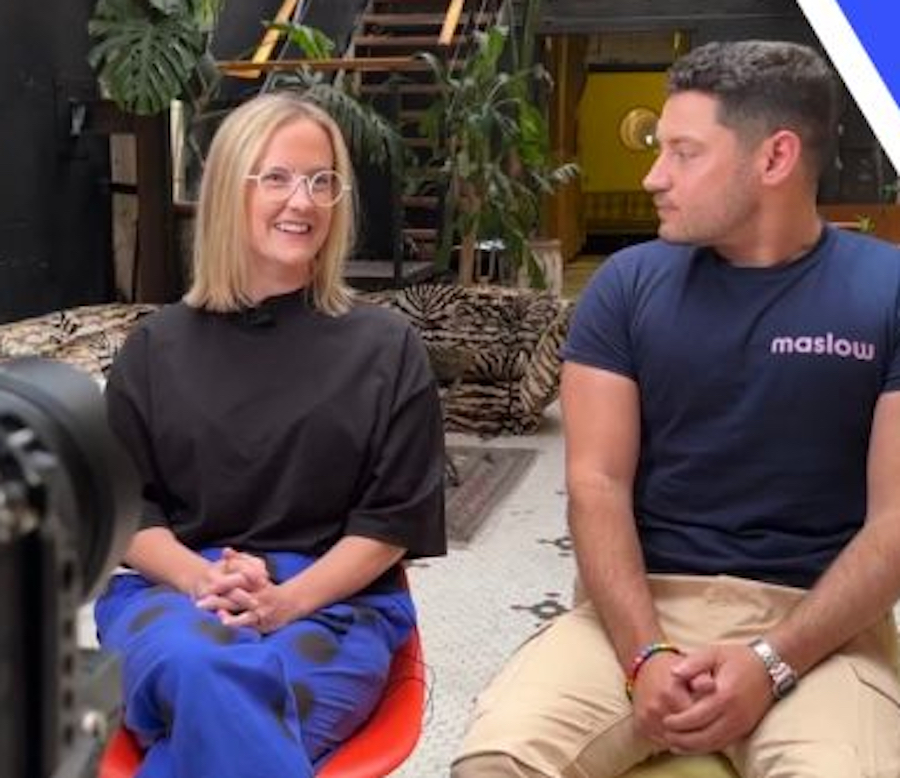
Two of Maslow's co-founders, Caitlin Robinson (L) and Kane Jackson
The fintech Maslow has set itself a target of one million customers in five years’ time. Up from zero at present.
In a Q&A with his co-founders yesterday, Maslow’s Kane Jackson told prospective investors that the company aimed to generate $240 a year (or $20 a month) on average, from a customer base of this scale.
Jackson said “we'll aim to save our average 45 year old customer between $4000 and $6000 a year by offering them at cost price” with Maslow linking its users with financial products and services that will be listed on their platform.
“We aim to charge that person 10 per cent of what we save them.”
Maslow has otherwise said it expects to charge users between $5 and $50 a month for access to the products on its platform.
Via a crowd-funding raise on Birchal, Maslow is seeking to raise $1.15 million to fund the next stages of the build of this platform. As of early this morning 167 investors had stumped up $261,000, with the offer closing in eight days.
High-impact negotiation
masterclass
July 9 & 16, 2025
5:00pm - 8:30pm
This high-impact negotiation masterclass teaches practical strategies to help you succeed in challenging negotiations.
Maslow is pre-revenue and pre-product. Were its audacious customer and average revenue targets met Maslow in five years’ time might have revenue of $240 million, while earning a handsome profit margin.
More certain is that Maslow will “still need to be raising capital in the months and years ahead.
“We’ll raise as much as we can through Birchal [then] raise more through larger and more aligned investors” Jackson said.
The platform Maslow is yet to build will be one that features a selection of high value financial services products from providers aligned with the fintech’s high-minded values, which scorn the ‘extractive’ underpinnings of contemporary finance.
Jackson offered two analogies for the business Maslow is building. One is Costco (a membership only big box retailer) and a second is a farmers cooperative.
“Farmers pay fees to be part of the co-op and get access to feed or farm equipment, and the co-op works to get the best prices and outcomes for them” Jackson said.
“The more farmers who join, the better the volume discounts.”
In Maslow world financiers had better get used to their business models adapting under the gaze of Maslow and their (future) user base.
“It's about changing the market from being one where hundreds of companies tell people their products are different and in which all pay ridiculous marketing costs to do so (because they aren't all that different) into a market that focuses on outcomes” Jackson told Banking Day.
“For example, do we need 50 car insurance products in market if we strip back the profit margin that incentivises those 50 companies to tell us their products are different? Probably not.
“And, if we start pulling that marketing dribble out of that space and lowering the cost of acquiring customers [via Maslow] it means that the products get cheaper with volume growth until, hypothetically, we reduce the number of suppliers from 50 to 10 or hopefully to five .... with the ones that survive being the best and/or cheapest.
“This is where Maslow's value to customers lies - in starting a process towards getting rid of the profit margin that drives the bulldust that plagues the industry.
“By pulling the profit margin off the financial products we step back from telling customers that X product is better than Y product because the company reliant on that profit says so.
“Rather, this allows products to be assessed on their merits and outcomes alone.”
However improbable all this sounds to establishment names in financial services, Maslow, if nothing else are crusaders who well and truly comprehend their mission.
Sticking with insurance as his example, Jackson explained: ‘There's circa 30 per cent profit margin in car insurance to the retail seller of an insurance product, and circa 20 per cent for the wholesaler.
“First, it's our aim to cut out the 30 per ceent ... and then eventually we want to manufacture insurance products so that they don't pursue profit at all, but that just pursue outcomes, with customers paying a fee to access them.”
During the Q&A Jackson declined to name the bank Maslow has selected as its first partner, though he said it was a bank with modern systems and a cloud-based platform.
Jackson did share the anecdote that early on Maslow approached Macquarie Bank.
“They asked, if we had the success we want, could they buy us? And we said no.”